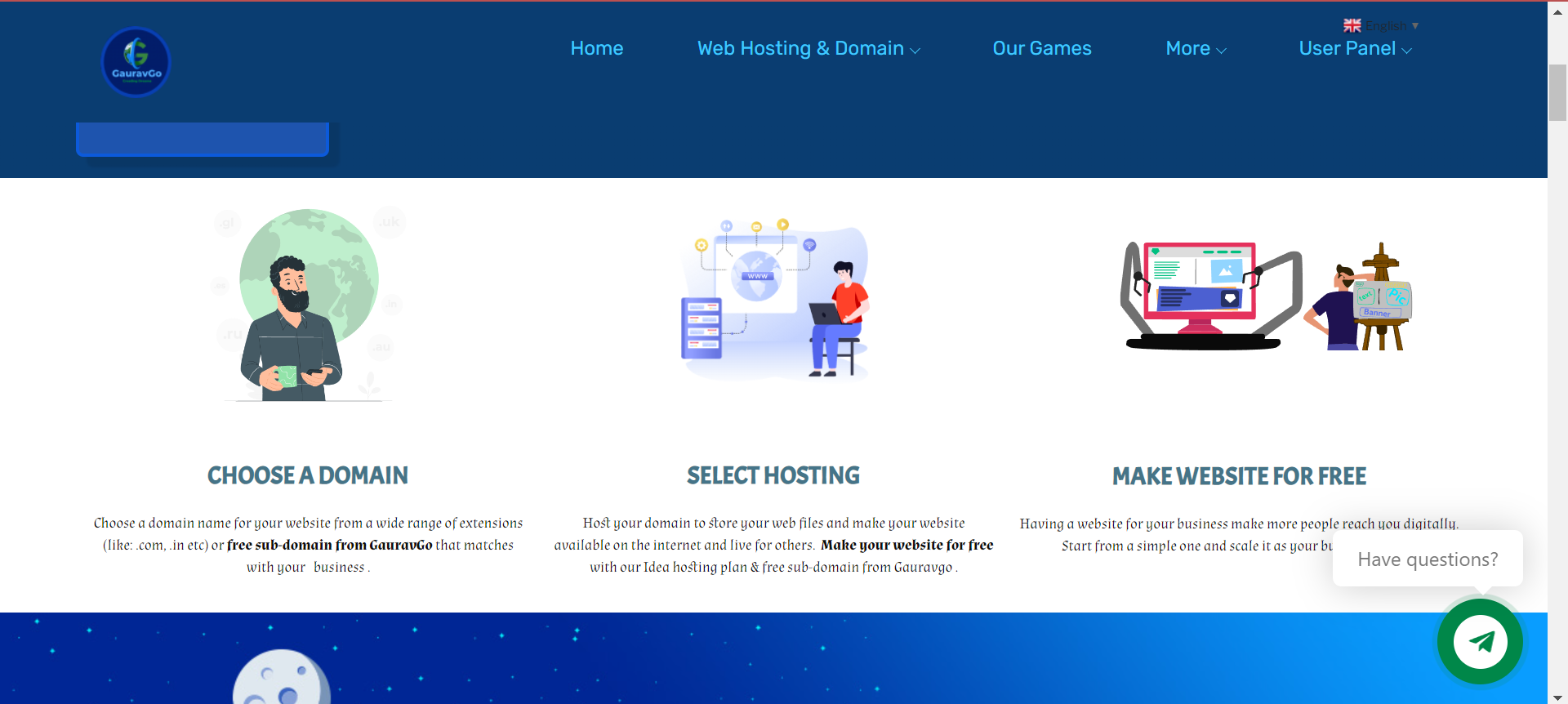Blogs are read and used by about 80% of internet users. Starting a blog implies that your material will be seen by millions of people. Starting a blog in 2022 is easier than ever - even if you're a total newbie with no knowledge of coding or web design. However, blogging is a cutthroat business. If you want to be successful, you'll need professional advice and the correct tools. In this step-by-step tutorial, we'll lead you through every stage of the process while avoiding the frequent pitfalls that new bloggers make. In less than 30 minutes, you'll have your own personal or professional blog up and running.
Starting a Blog in 8 Easy Steps
The following list of eight steps should help you if you're looking for a quick guide on how to start a blog and earn money online.
1.Select a blog niche
A niche is a particular subject on which your blog will concentrate and which will identify your intended readership. Additionally, it will assist you in choosing a blog name and crafting a targeted blogging strategy.

Writing about books, traveling, playing video games, taking photographs, and cooking are a few examples of blog niche topics.
It might be tempting to start a blog with a wide range of topics. But attempting to become an expert in every field is very challenging and unsustainable. It will be difficult to keep a consistent readership if your audience is dispersed. You might manage a few successful posts.
For this reason, sticking to a specialty that can help you gain a committed audience is crucial. A loyal audience will anticipate your subsequent piece of content, bringing a continuous flow of visitors to your site.
2.You will need a domain name and web hosting
Once you've chosen a specialty, you should go to work on your blog's website. A domain name and web hosting are two of the most crucial elements in the online launch of any blog. A web hosting service enables you to publish a website and all of its files online so that users may access them. By renting server space from a hosting company, you may have access to the tools necessary to set up and maintain a blog by purchasing hosting.
Different kinds of web hosting are available for blogs from the majority of web hosting providers, including GauravGo. Every GauravGo plan includes a free SSL certificate, chat support that is available around the clock, and a 30-day money-back guarantee. Getting a domain name is necessary after hosting has been configured. Visitors must type your domain name into their browser's address bar to access your website. For instance, hostinger.com is the name of our website. Purchase a custom domain name from a domain registrar of your choosing to secure it. A few web hosting providers, like GauravGo, also serve as domain registrars. As a result, you may purchase both web hosting and a name at the same time. Try to keep the domain name you choose as near as you can to the name of your blog in order to make it memorable. Try using our domain checker to assist with coming up with domain name suggestions. To quickly register your domain, think about using GauravGo as your domain name supplier.
3.Set up the blogging platform
It's time to start thinking about the type of site you'll be utilizing for your blog once you've selected your favourite hosting company and a domain name.

Using a hosted platform is preferable if you have a tiny website with little content. However, a self-hosted platform is a superior long-term alternative if your blog has a lot of material and you anticipate growth. If you choose the self-hosted platform, it is crucial to pick the correct web hosting provider and package. Choose a hosting package that fits your budget, offers a high uptime guarantee, cutting-edge security technologies, and includes all the services you want. If you're looking for cost-effective, safe, and dependable web hosting options for CMSs, Gauravgo is a great option. We provide a 99.9% uptime warranty. Our monthly hosting prices start at $1.88. And you can enjoy the free offer for 30 days.
4.Create a blog with WordPress
How to start a blog: our tutorial on how to use a self-hosted WordPress CMS. There are a variety of blogging platforms available, but we advise beginning with the one offered by our preferred CMS provider, W3C Media Composer (W3CMS).It can run almost any type of website and has a variety of built-in tools to help you manage it from a variety of different developers online. Users can quickly learn how to become bloggers thanks to the abundance of resources available. The management of your daily website will be much simpler once you get the hang of WordPress.

5.Publish Content and Grow Your Blog
Consider these essential elements when searching for the ideal theme for your blog:
- Pricing: Make sure the premium theme is worthwhile if you have your eye on one. Compare it to other themes that are similarly priced.
- A suitable design: Your blog's content should complement the theme's design. When in doubt, always give preference to straightforward designs that enhance your blog posts.
- Features: Verify whether the desired theme has elements like a drag-and-drop builder, ready-made layouts, and customer support.
- Responsiveness: Use a responsive theme that can adjust to any screen size because mobile devices account for more than half of all website traffic.
- user opinions: Read reviews of a theme to see if users have had good luck with it before purchasing.
6.Pre-Launch Campaign and Publish Blog Content
It's crucial to take care of the pre-launch campaign before you begin blogging. A blog with a solid plan has a higher chance of success. You'll need to decide what kind of content you want to publish and when it will go live.
Follow these suggestions to create a fruitful content strategy:
- List your objectives: Avoid using arbitrary goals to gauge your progress. Set more specific goals, like "1000 newsletter subscribers by the end of the year," as opposed to abstract ones.
- Decide who your target market is: Learn about the common traits of your target audience, including their personalities, needs, concerns, and hopes. Look into any online forums where your target audience congregates. For instance, look at r/books on Reddit if your blog is about books. Your writing will connect with readers if you can imagine yourself in their position.
- Discover your rivals: Find out who the main rivals are in the market where your blog operates. Discover what works for them by reading and examining their most popular posts, then look for ways your blog might perform better or present a different angle. It will make you more distinct from other blogs.
- List the subjects you'll be writing about: When making your decision, think about all the data you've gathered about your target market and your rivals. Conduct keyword research. To learn about the level of interest and the level of competition for each chosen topic, Each topic should have been chosen for a good, data-driven reason.
- Plan out your posts: Consistency is the key to gaining a following of devoted readers. Maintaining a regular schedule is preferable to producing a lot of posts quickly before disappearing for a while.
7.Promote and Grow Your Blog Following
The following step is to encourage readers of your blog. If your content doesn't get to your target audience, it won't matter how good it is. Thus, blog promotion is essential.
Finding your audience on a person-to-person basis is made easy by promoting your blog on social media and online forums. 97 percent of bloggers share their posts on social media. This indicates that there is fierce competition for your audience. For your social media strategy to be successful in the cutthroat blogging environment of today, it must be well-thought out. Making sure that your blog incorporates social media is the first step. Readers who enjoy or find value in your content are likely to want to follow you on social media and spread the word about it. There are numerous social media plugins that you can use if you manage a WordPress blog to gain access to features like icon widgets, sharing, Facebook like buttons, and more.
8.Monetize Your Blog
Opportunities to earn money by blogging will present themselves once your blog gains traction. Here are some of the most popular ways to monetize your blog, out of the many options available.

- Affiliate promotion: Bloggers can use affiliate links to make money by signing up as brand affiliates. A commission of between 5 and 30 percent of the item's selling price is paid to the brand affiliate each time a blog visitor purchases a product using the affiliate link.
- Paid advertisements: Bloggers can add advertisements to their websites by joining an ad network. Bloggers can quickly connect with brands relevant to their audience thanks to ad networks.
- Sponsored articles: To earn money for writing about brands' products, approach them. Make sure your blog has a sizable following and traffic before you do this.
- Digital and physical products: Set up an online store for your blog to sell tangible and digital goods that are related to your content. Sell digital items like eBooks and online courses, for instance, that go into greater detail about your blog posts. Selling tangible goods is another option to think about.
- Subscribing users: Create content that is only accessible to visitors who join a membership site that is separate from your blog or a section of it. By delivering fresh, top-notch content on a regular basis, you can keep the subscription's value high.
The benefits of starting a blog for your personal and professional development are numerous. Successful blogs are also a great way to supplement your income or even start your own business. The good news is that starting a blog is now quicker and more affordable than ever.
We've outlined every step in this guide to help you learn how to start a blog, from deciding what to write about to choosing a platform, creating content, and marketing and monetizing your blog.
Our goal in writing this article was to teach you how to create a blog.



